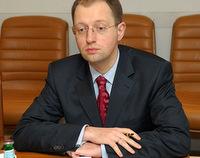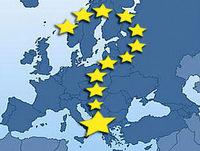Joint European Army Of Tomorrow: A New Perspective

NATO has been actively discussing the possibility of establishing a joint European army for a long time. The latest discussion was triggered after The Times published an interview with Italian Foreign Minister Franco Frattini on November 15, 2009. READ MORE
Ukrainian Presidential Candidate Arseniy Yatseniuk’s Foreign Policy

In 2008-2009 Arseniy Yatseniuk grew rapidly in popularity and was seen as the rising star of a “new generation of Ukrainian politicians,” with some even touting him as “Ukraine’s Obama” who would inevitably prove “pro-Western.” Evidence of Yatseniuk’s pro-Western stance was seen when he promoted Ukraine’s trans-Atlantic integration as foreign minister in 2007-2008, his election in the first five candidates of the pro-Western Our Ukraine-People’s Self Defense bloc in the 2007 elections and his signature (together with President Viktor Yushchenko and Prime Minister Yulia Tymoshenko) on a January 2008 letter to NATO requesting a Membership Action Plan for Ukraine. READ MORE
Obama Will Attend UN Climate Summit In Copenhagen

Obama has already shown commitment to the climate by leading a conference at the UN The White House has announced that US President Barack Obama will be attending the Climate Summit in Copenhagen next month, giving the negotiations fresh momentum. READ MORE
Will Russia Profit From The Single European Presidency?

Europe is almost a single state now, not only with common finances, common borders and common economic space but also with one president and one foreign minister. READ MORE
Jouyet: German Reunification ‘Not Easy To Accept For Paris'

The 1992 Maastricht Treaty, which created the European Union and led to the creation of the euro, came as an answer to French concerns over the German reunification process, Jean-Pierre Jouyet, former French State Secretary for EU affairs, told EurActiv France in an exclusive interview. READ MORE
The USA Sets Conditions for OSCE Summit

During the hot line, held simultaneously in the Internet, via phone and mobile, replying to the question of the President of the Chamber of Commerce and Industry of the Russian Federation, former Prime Minister and Minister of Foreign Affairs of Russia Yevgeny Primakov about the work within the framework of Kazakhstan Presidency in OSCE in 2010, President of Kazakhstan Nursultan Nazarbayev declared about the intention to call the Summit of the member-states of the organization. READ MORE
Turkey Is Key To Europe's Energy Diversification

Turkey can play a key role in overcoming existing hurdles to the realization of the Nabucco pipeline project, which will augment Europe’s energy security. In return the EU should assist Turkey on its path to EU membership. READ MORE
A Brief Guide To The EU's Lisbon Treaty

The Treaty of Lisbon is set to finally go into force on December 1. Answers some of the most pertinent questions about the landmark European reform document. READ MORE
Who is going to be the next?
Who is going to be the first to recognize Abkhazia and South Ossetia: Belarus or Peru? The delegation from Minsk has studied the situation in Tbilisi, Sukhum and Tskhinval to submit its conclusions to the parliament. At the same time, it became known that the opposition of Peru put forward a proposal to recognize the independence of the two Caucasian republics following the example of Nicaragua and Venezuela. READ MORE
Azerbaijan Seeks Alternative Gas Export Routes: Sending a Signal to Ankara

“We are interested in exporting our resources through different routes,” Azerbaijan’s President Ilham Aliyev stated during his visit to Bulgaria on November 13. On the same day, he paid a short working visit to Sofia to meet his counterpart Georgi Parvanov and to sign an inter-governmental agreement on the transit of Azeri gas to Europe though the Black Sea. This was the third agreement signed with a foreign country during the past month. Previous agreements were signed with Russia and Iran. Analysts believe that these latest developments hint at Baku’s plans to diversify its export options and reduce its dependence on the so-called “Turkish route”. READ MORE
The Molotov-Ribbentrop Pipeline
Rügen is best known as a popular German tourist destination. But now the Baltic Sea island has taken on a new role as staging point for an energy project that is as ambitious as it is controversial: the Nord Stream gas pipeline from Russia to Germany. Next spring the first pipeline segments will likely be dropped to the sea floor in a line that will wind through Russian, Finish, Swedish, Danish and German waters—conspicuously avoiding the Baltic states and Poland. READ MORE
Bridge on the Dnieper

Ukraine is in the news again, this time for its panicked response to a flu epidemic that has claimed over three hundred lives. In many countries, this would simply be a matter of public health, but in Ukraine, where politics is polarized by culture and region, an epidemic is another excuse for partisan wrangling. President Viktor Yushchenko is engaged in an escalating verbal battle with Prime Minister Yulia Tymoshenko, a onetime ally now angling for his job. A presidential election is scheduled for January 17. READ MORE
Belgian PM named as EU president

EU leaders have chosen the Belgian Prime Minister, Herman van Rompuy, to be the first permanent European Council President. READ MORE
Russia Makes Surprise CO2 Pledge At Summit
Russia made a surprise pledge to cut back on CO2 emissions at a summit with the EU in Sweden on Wednesday (18 November). Russian diplomats said the country is ready to cut emissions by 20 to 25 percent below 1990s levels by 2020, up from a previous commitment of 10 to 15 percent. READ MORE
Continuity Rules In Germany's Foreign Policy Toward The Americas

Germany's diplomatic relations with the Americas are shaped by continuity, a clear focus on the US and by the dominant role played by Chancellor Angela Merkel. That leaves little room for the new foreign minister. READ MORE
Moldova Suffering From Wave Of Migration

The new western-leaning government in Moldova faces many challenges in the southern European country. Increasing parts of the population are leaving in search of a better life. But many return disillusioned. READ MORE
A Promising Land: Russian State Companies Expect Major Discoveries In Central Asia

Gazprom and Rosneft are accelerating exploration efforts in Central Asian onshore projects. Their experience may show that interesting opportunities exist away from the Caspian Sea oil and gas fields, where most of the business focuses on. READ MORE
Analyst: Russia Pushing US Out Of Europe

US President Barack Obama "does not care very much" about security in Europe, Edward Lucas, who has been The Economist's Eastern Europe correspondent for more than 20 years, told EurActiv Slovakia in an interview. READ MORE
Waiting For The Trans-Atlantic Wave

It is symbolic that the 20th anniversary of the fall of the Berlin Wall was celebrated at the moment when the black-yellow coalition – the grouping of CDU/CSU – Free Democratic Party – came back to power in Germany. In 1989, when the peaceful anti-communist revolution happened in GDR, Western Germany’s government also consisted of CDU/CSU and FDP. At that time Chancellor Helmut Kohl, leader of Christian Democrats, and Vice Chancellor Hans-Dietrich Genscher, FRG Foreign Minister and head of Free Democratic Party, played a great historic role in the unification of Germany. READ MORE
Southern Corridor, White Stream: The Strategic Rationale

White Stream, the proposed gas pipeline from Georgia to Romania on the seabed of the Black Sea, is intended to maximize European gas imports from Central Asia through the E.U.-initiated Southern Corridor. The Corridor grand design spans Azerbaijan, Georgia, Turkey, and –with White Stream– also a maritime route to European Union territory via the Black Sea. At its other end, the Southern Corridor is premised on a trans-Caspian link to Turkmenistan for massive European imports of Central Asian gas. READ MORE
Armenian 'Homeland' Concept Might Affect Turkey And Georgia

Recent changes in the geopolitical situation in the South Caucasus have led to a dangerous trend for the region - and sharply exacerbated Armenians' feelings of a homeland around the world. READ MORE
Moldova Keeps Fighting For Attention

The Republic of Moldova surprised many in April when youths took control of Chisinau's main square, Piata Marii Adunari Nationale. The young Moldovans protested against the Communist-controlled government’s way of conducting parliamentary election. READ MORE
The Caspian Comes To Europe

If EU policymakers and companies are not going to go to Caspian energy producers with serious offers for their hydrocarbons, Caspian producers will just have to come to the EU. That seems to be the message being sent by Azerbaijan and Kazakhstan as their state energy companies partner to build an oil pipeline heading West-ward. Plans for the so-called Baku-Black Sea pipeline were announced at the Atlantic Council’s Black Sea Energy and Economic Forum in Bucharest on Oct. 2 by Vitaliy Baylarbayov, Deputy Vice President of SOCAR, the state oil company of Azerbaijan. READ MORE
Gazprom In Europe: Russian Government Plans To Share Part Of Yamal Gas Resources

The Russian government plans to share bits of the giant Yamal prize with international companies. However, rather than a sign of liberalism, this represents an attempt to address the fundamental challenges that the expanding Gazprom is facing in Europe. READ MORE
November 9, 1989 - The Day That Changed European History

In a press conference on Nov. 9, 1989 GDR central committee spokesman Guenter Schabowski unintentionally announced that citizens could travel to West Germany immediately. It was the beginning of the end for East Germany. READ MORE
The V-4 States And Russian Initiative “Helsinki Plus”

The joint position of the members of the Visegrád Group V-4 promotes their weight and this should be considered within discussion of almost all big issues and problems. The list of big lately actualized European issues includes also Russian initiative on the European Security Treaty (EST), which is also called “Helsinki plus” in Moscow. READ MORE
Ukrainian Signs In Turkish March: New Reality Of Energy Policy

The Prime Minister of the Republic of Turkey Recep Tayyip Erdoğan said one of those sayings, which perfectly characterizes current role of Turkey within international political and economic arena: "Turkey is the extreme Eastern point of West and the extreme Western point of East". READ MORE
George Krol About US Relations With Central Asia Republics

George Krol, Deputy Assistant Secretary of State for South and Central Asian Affairs with VOA TV Uzbek Service – Navbahor Imamova. READ MORE
Berlin Wall's Lessons For Today

The oxygen of a free society is accurate and trustworthy information. Yet even today, regimes around the world are intent on cutting off the supply. READ MORE
Westerwelle Calls For Protection Of German Opel Jobs In Clinton Meeting

German Foreign Minister Guido Westerwelle met with US Secretary of State Hillary Clinton in Washington Thursday, with a raft of issues on the agenda. The fate of German carmaker Opel is Germany's biggest concern. READ MORE
Azerbaijan Could Scuttle Nabucco Over Turkey-Armenia Deal

Azerbaijan has apparently decided to play its energy card. As much of the world applauded Turkey's historic rapprochement with Armenia last week, Azerbaijan felt left out in the cold and abandoned by its closest ally. READ MORE
Merkel Urges US, Europe To 'Tear Down Today's Walls'

Angela Merkel accepted a rare invitation and addressed the US Congress to mark the 20th anniversary of the fall of the Berlin Wall. The German chancellor made it clear that climate change is a top priority. READ MORE
Slovak Commissioner: 'My Affiliation Is Social Democratic'

Despite until recently being of no political 'colour', Slovakia's newly-appointed EU commissioner, Maroš Šefčovič, will represent the social democratic political family in the EU executive, he told EurActiv Slovakia in an exclusive interview. READ MORE
Europe's Quiet Leader

Did you know that there were elections in Germany a month ago? Were you aware that the German Socialists were soundly defeated? Had you realized that there was now a new government in Germany? No? Then give credit -- both for the victory and the fact that you haven't heard about it -- to Angela Merkel, chancellor of Germany. READ MORE
Czech President Finally Signs EU's Lisbon Treaty

Czech President Vaclav Klaus has finally given up his resistance to the Lisbon Treaty and opened the way for reform of the European Union. READ MORE
Hearing: Advancing U.S. Interests In The OSCE Region

COMMISSION ON SECURITY & COOPERATION IN EUROPE:
U.S. HELSINKI COMMISSION
ADVANCING WITH U.S. INTERESTS IN THE OSCE REGION READ MORE
Kyrgyzstan's Role In Regional Security

With the war in Afghanistan drawing international attention, the Kyrgyz Republic and other Central Asian countries seem to have fallen off of the American agenda. During his diplomatic visit to the United States, Kyrgyz Foreign Minister Kadyrbek Sarbaev spoke at the Carnegie Endowment about the need to revamp Kyrgyz-US relations. In particular, he stressed that many of the problems plaguing Afghanistan and Kyrgyzstan are in fact regional problems, and that multilateral negotiations and mutual concessions can help find solutions to these problems. READ MORE
“The Event Was A Shock, We Had To Wait And See If It Was Going To Happen Peacefully”

20 years ago Jacques Delors, then President of the European Commission watched as the Berlin Wall fell. A privileged spectator of such historic change and a player in managing the consequences, he spoke to euronews about the days and weeks that changed the face of Europe. With two decades of hindsight, he told us what he feels about today’s Europe and the Europe of the future. READ MORE
Uzbekistan Challenges Regional Electricity Supplies Network

Kyrgyzstan’s growing list of troubles has recently been further complicated by yet another predicament. Tashkent has announced that Uzbekistan is likely to leave the Central Asian power supply cascade in the coming months. According to Tashkent’s official interpretation, Uzbekistan can now provide its population with enough locally generated electricity and does not need to be part of the network created during the Soviet period. This means that Kyrgyzstan’s south and parts of Tajikistan will experience severe electricity shortages due to the break in regional cycles. READ MORE
Britain Attempts Own Russia 'Reset' With Miliband Visit To Moscow

After years of tension, Britain and Russia are attempting to reset their relations as the British foreign secretary, David Miliband, met with his counterpart Sergei Lavrov in Moscow. READ MORE
Lithuania’s Demands Taken Into Account

Agreements reached by the EU Member States at the European Council attended by the President of the Republic of Lithuania Dalia Grybauskaitė and Prime Minister Andrius Kubilius open up the way for the development of the Baltic Sea region and give a mandate for the European Union to participate in global negotiations in Copenhagen on responding to consequences of climate change and financing the response. READ MORE
Bulgaria Ousted From Russia's South Stream Pipe

Russia has obtained all the permits necessary to build its 'South Stream' gas pipeline through Turkish territorial waters, discarding Bulgaria as one of the project's transit countries, the Russian press writes. READ MORE
Uzbekistan: European Union Looks Likely To Lift Arms Embargo
The European Union appears poised to lift its four-year arms embargo against Uzbekistan. EU officials say strategic necessity is exerting pressure on Brussels to fully engage Tashkent. Critics, however, contend that by compromising on principles, the European Union is sacrificing long-term interests for immediate, but likely fleeting gains. READ MORE
Is the Sky is Clear Above All Georgia?

In December Abkhazia will hold another Presidential elections. Official election campaign hasn’t started yet, but its general lines are pretty evident. In a sense we can talk about return to the situation of 2004 – but in a mirror reflection. READ MORE
European Leaders Agree To Czech Demands Over Lisbon Treaty

EU leaders have agreed to allow the Czech Republic to opt out of a part of the EU's reform treaty, removing one of the last barriers to ratification. The Swedish EU presidency says talks must now shift to the climate. READ MORE



